Thyme is a versatile herb that has been used for centuries. Not only is it a popular ingredient in the culinary world, but it has also made a name for itself in aromatherapy.
Thymus vulgaris, commonly known as thyme or red thyme, owes its reputation to its pleasant perfume. It’s no wonder many people turn to Thyme Essential Oil for its aromatic properties. But did you know that Thyme Essential Oil also has a lot of benefits and uses? With the right recipes, you can make the most of this versatile oil in the comfort of your own home. So, whether you’re a seasoned essential oil user or just starting, keep on reading to discover Thyme Essential Oil benefits, uses, and recipes that you’ll surely love!
How It’s Made
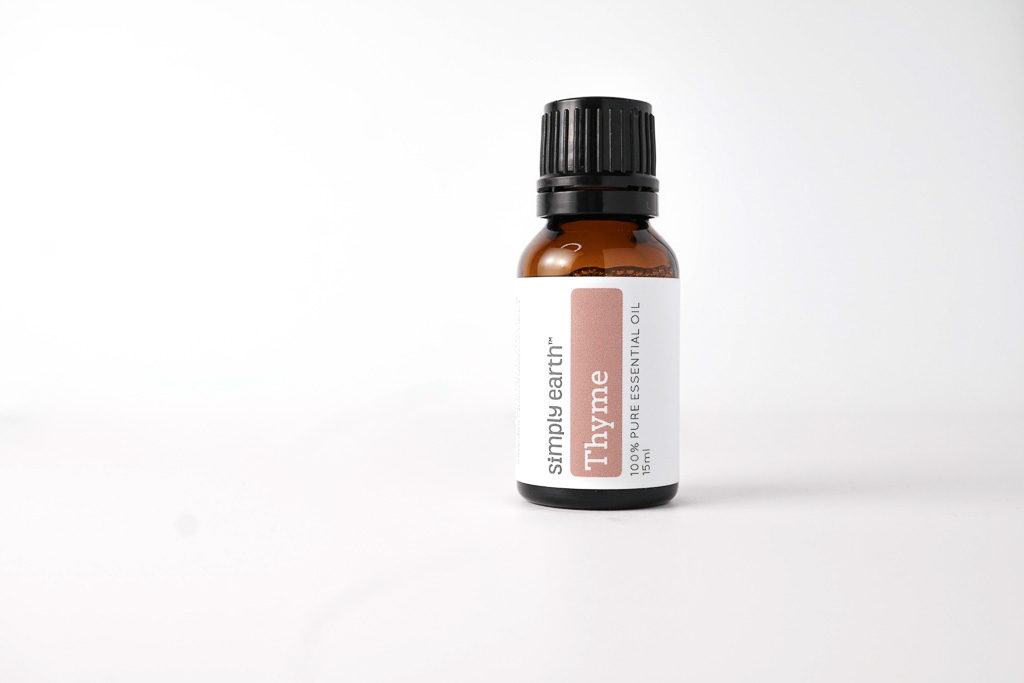
Thyme Essential Oil is created through steam distillation, which means that steam is used to extract the oil from the plant. It takes quite a bit of thyme to produce just a small amount of oil – around 3 pounds of the herb are needed to make just 15mL of essential oil. But the end result is worth it!
Thyme Essential Oil Benefits
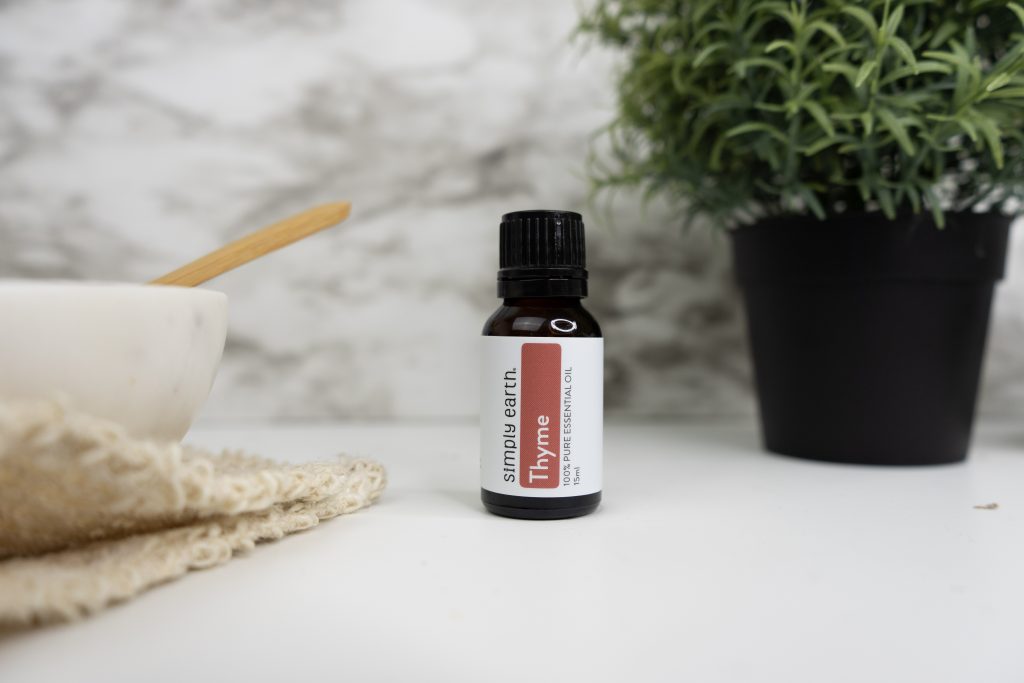
Supports Respiration
If you’re struggling with coughs and colds, Thyme Essential Oil may be just what you need. Thanks to its thymol content, this oil has antispasmodic properties that can help soothe and reduce the duration of respiratory tract infection symptoms, according to this study1.
Cleans
Beyond its amazing aroma, Thyme Essential Oil is a powerful cleaner that can help keep our homes free from toxic fumes found in store-bought, chemical-laden cleaners. Thanks to thymol’s antifungal and antibacterial properties. It even does an impressive job disinfecting different mold species, as proven by this study2.
Promotes Circulation
If you’re looking for a natural way to promote circulation, Thyme Essential Oil could do the trick! When applied topically, it has a warming effect that can help get the blood flowing, which makes it amazing for massages, especially in the colder months.
Detoxifies
One of Thyme Essential Oil’s biggest perks is its ability to detoxify. That’s right, this oil can help clear out toxins from your body. A study3 even found that Thyme has a marked effect on the body’s antioxidant metabolism. Basically, it helps keep your body functioning at its best.
Promotes Brain Health
Thyme Essential Oil also has some amazing benefits for your brain health! A recent study4 has shown that this oil may help prevent memory deficits and oxidative stress in the brain. That means this little oil can potentially help keep our minds sharp and healthy as we age.
Deters Insects
Thyme Essential Oil has incredible benefits when it comes to repelling insects. A study5 found that this powerful oil effectively deterred mosquitoes with a protection rate of a whopping 91% with topical application.
Thyme Essential Oil Uses & Recipes

Health & Wellness Recipes
If you’re on the lookout for a natural way to boost your health and wellness, Thyme Essential Oil might be the answer you’re looking for! This all-natural oil has a range of benefits when it comes to respiratory health, circulation, detoxification, and even cognitive function. Some great ways to incorporate thyme into your routine includes adding it to massages or bath recipes for a relaxing and restorative experience or using it in aromatherapy recipes to help support your overall wellness.
Insect-Repelling Recipes
Not only does this fragrant oil have a myriad of health benefits, but it’s also a natural insect repellent. From mixing it with your favorite body lotion to creating your own DIY bug spray, Thyme Essential Oil can help keep those unwanted critters away while you enjoy being outdoors.
All-Natural Cleaning Recipes
Have you ever found yourself struggling to find an affordable and natural way to keep your living space clean and smelling fresh? Thyme’s deodorizing and cleansing properties make it a great ingredient to add to cleaning recipes.
Diffuser Blend Recipes
If there’s one thing we can all agree on, it’s that Thyme Essential Oil smells amazing. Whether you’re feeling a little under the weather or just want to enjoy the wonderful aroma, you can diffuse it with other complementary oils for a custom blend that is sure to delight your senses and soothe your cough or cold.
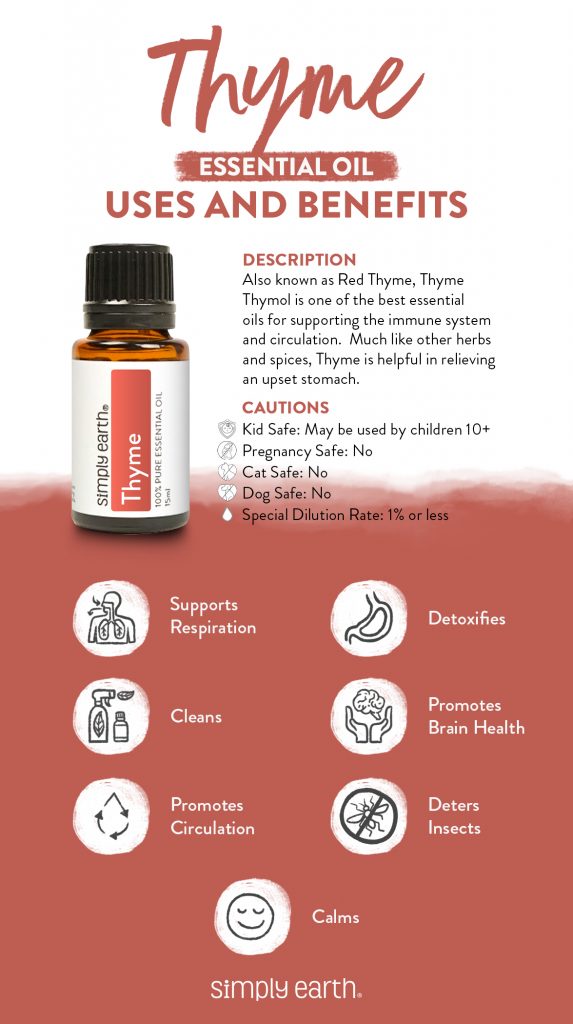
Thyme Essential Oil Blends Well With…
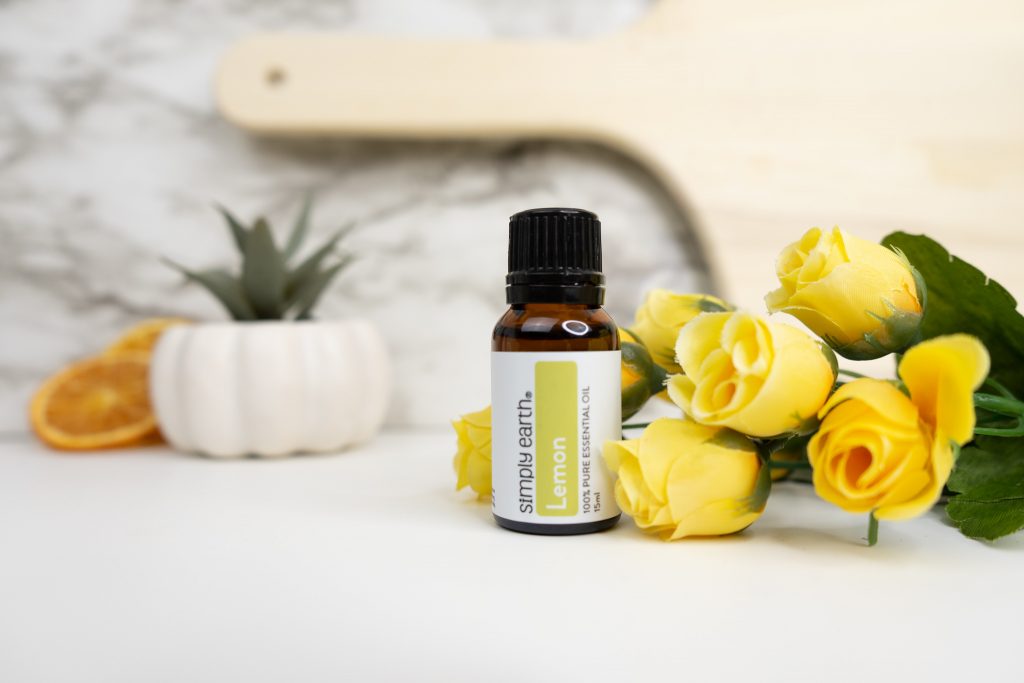
Thyme Essential Oil has a warm, herbaceous scent with spicy and woodsy notes. It pairs beautifully with other herbal oils such as Basil and Oregano, as well as other essential oils like Fennel, Geranium, Ginger, Grapefruit, Lavender, Lemon, Marjoram, Pine, Sandalwood, Tea Tree, and Vetiver.
What’s the Science Behind This Oil?
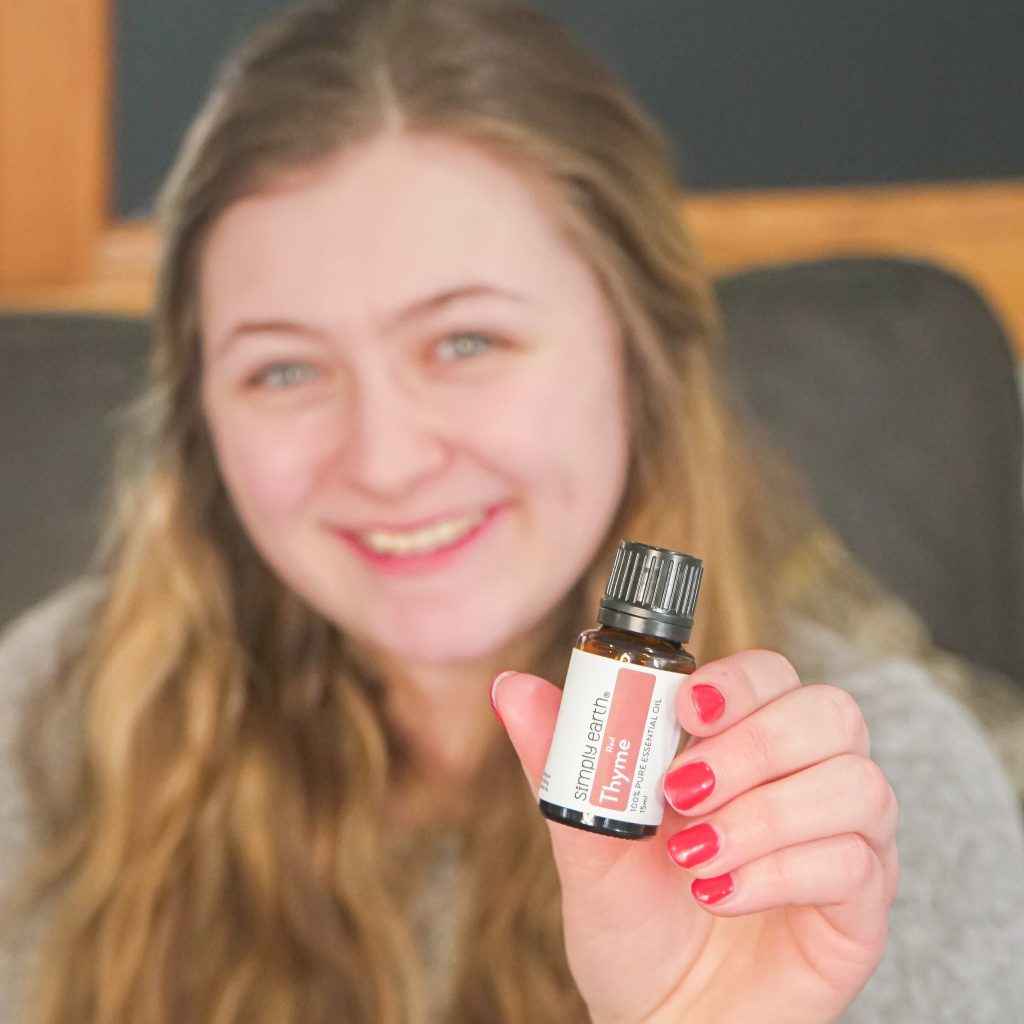
History of Thyme Essential Oil
Thyme Essential Oil has an extensive and fascinating history that stretches all the way back to ancient Rome. As a symbol of courage, it was added to the bathwater of Roman soldiers to help them prepare for battle. People even exchanged Thyme (Red) as a sign of respect for each other. The Ancient Egyptians also recognized the power of thyme, using it in the embalming and mummification process. Later on, Medieval herbalists turned to thyme to ward off evil spirits and nightmares, ensuring a peaceful and restful night’s sleep by tucking sprigs of the herb under pillows. It’s no wonder Thyme Essential Oil has been revered for centuries for its ability to soothe the mind, body, and soul. Hailing from France, the Mediterranean regions, and other parts of southern Europe, Thyme Essential Oil has certainly earned its place in history.
Chemical Constituents
Thymol
It is a white crystalline substance with a pleasant aromatic odor and strong antiseptic properties used in preventing mold growth, as a pesticide, and as a medical disinfectant and general-purpose disinfectant.
para-Cymene
p-Cymene is a naturally occurring aromatic organic compound. It is a constituent of a number of essential oils, most commonly the oil of cumin and thyme. It has a role as a plant metabolite, a volatile oil component, and a human urinary metabolite. p-Cymene is used in cleaning products, household care, flavoring, and fragrance.
Carvacrol
Carvacrol, or cymophenol, has a characteristically pungent and warm odor of oregano. It is present in Oregano, Thyme, Pepperwort, and Wild Bergamot Essential Oils. Carvacrol has antimicrobial activity against 25 different phytopathogenic bacteria and strains.
What Earthies Are Saying About It
Things to Remember When Using This Oil

Always dilute an essential oil when using it on the skin. This essential oil is unlikely to cause skin irritation when diluted properly. If the oil has been oxidized (left with the cap off for long periods of time) it is more likely to cause skin irritation. Check out this dilution chart for diluting this essential oil properly.

This oil is generally not safe to use if you are pregnant. Consult your doctor prior to use.

This essential oil is safe to use with kids 10+.

For more information on using essential oils with cats, check out this blog post.

Dogs may find this oil irritating. However, we do not expect your dog to be disturbed if you use this oil on yourself. Just be mindful of your pet’s behavior. For more information on using essential oils with dogs, check out this blog post.
We don’t recommend ingesting essential oils unless under the direction of a doctor certified in aromatherapy. For more information on why we don’t ingest essential oils check out this blog post.
*Please note: This post is a compilation of suggestions made by those that have extensively used essential oils and has not been verified scientifically with clinical tests nor reviewed by medical experts. It is anecdotal information and should be treated as such. For serious medical concerns, please consult your doctor. The statements given in this blog post have not been verified by the FDA
References:
- Schönknecht K, Krauss H, Jambor J, Fal AM. [Treatment of cough in respiratory tract infections – the effect of combining the natural active compounds with thymol]. 2016
- Segvić Klarić M, Kosalec I, Mastelić J, Piecková E, Pepeljnak S. Antifungal activity of thyme (Thymus vulgaris L.) essential oil and thymol against moulds from damp dwellings. 2007 Jan
- R Gumus, N Ercan, H Imik. The Effect of Thyme Essential Oil (Thymus Vulgaris) Added to Quail Diets on Performance, Some Blood Parameters, and the Antioxidative Metabolism of the Serum and Liver Tissues. 2017 Apr
- Capatina L, Todirascu-Ciornea E, Napoli EM, Ruberto G, Hritcu L, Dumitru G. Thymus vulgaris Essential Oil Protects Zebrafish against Cognitive Dysfunction by Regulating Cholinergic and Antioxidants Systems. 2020 Nov
- Choi WS, Park BS, Ku SK, Lee SE. Repellent activities of essential oils and monoterpenes against Culex pipiens pallens. 2002 Dec

